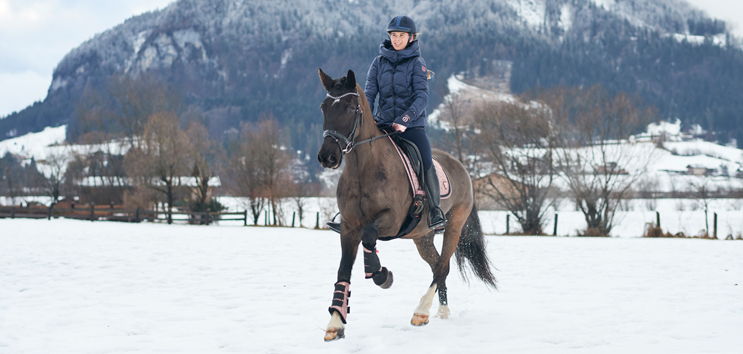Winter is already in full swing and it's cold and unpleasant out. In the evenings, you cuddle up on the sofa with a warm, fluffy blanket and a mug of hot chocolate in your hands, watching Netflix. And while you're snug as a bug in your living room, your horse is out in the dark and the cold, and you start to wonder: how does my horse deal with the winter time? Is my horse feeling cold? Do I need to give extra feed? Or do I need to adapt my training when it's freezing outside? In this blog, we explain everything you can do to make sure your trusty four-legged friend is getting through the winter season safely and healthily.

Feed
When it's getting colder outside, the body of a horse requires more energy in order to stay warm. Energy comes from food, so your horse has a greater need for getting roughage in the winter. If possible, in an ideal scenario, your horse should have unlimited access to roughage throughout the winter. Keep a close eye on your horse, watch out for any changes and adjust the feeding according to the training and the quality of the roughage being fed.
As most horses have to spend more time in the stable during winter, instead of being out all day and night like in the summer time, it's great to the roughage in a slowfeeder, haynet or haybag. This slows the horse down, gives it something to do and therefore helps against stable boredom - plus, it's less messy and makes mucking out easier for you too!
Immune system
Are you noticing that your horse's condition has changed, that it's more susceptible to being a little sick, feels generally weaker and more tired? It could be that your horse's immune system is in need of a little boost! Just like for humans, horses are also feeling the effects of winter with its long darkness and grey skies. With the following healthy extra you can help and support your horse during winter.
PharmaHorse Vitamin E
Pavo Vital
Puur Vitamins & Minerals
NAF General Purpose Supplement
Pavo HealthBoost
Sectolin Gold Mix
Rosehips
Water
Water is super important and often overlooked. A grown horse needs about 40-50 liters of water a day. When your horse doesn't get enough water, it will also eat less, which then leads to a decrease in condition and immune system. This can easily be followed by various other health problems. Make sure that the pipes or water troughs are well-insulated and won't freeze without you knowing!
It's very, very important that your horse has unlimited access to fresh water!
Rug or no rug?
Does my horse need to be rugged or not? A clipped horse needs to have a nice winter rug on, as it's natural insulation mechanism - the fur - is gone. Always make sure that a clipped horse has a warm enough rug on, and get a thicker one or use liners if your horse gets too cold. Horses that are not clipped usually will only need a rug if the temperature drops below roughly -5 degrees Celcius. Depending on how much fur your horse has and how sensitive they are to the cold, they might never need one or already start getting cold before it even hits 0 degrees. You know your horse best and will have the best idea of when it's too cold - just make sure you're not basing whether your horse is cold or not on your own, personal feeling for the cold. Horses can take a lot more than we can!
One of the biggest challenges of rugging a horse is finding the perfect, well-fitting rug. There's lots of different types, sizes and brands for rugs. Especially choosing the correct rug size can be rather difficult. That's why we made a rug fitting guide for you with handy instructions and tips.
Movement
Horses often don't get to move around enough, as they're stabled more over the winter and have limited possibilities to move, run and play as they like. When you're cutting down training for your horse, for example when your arena is frozen over or is too wet, make sure that your horse gets enough time to move around! Have your horse outside freely as much as possible. Do you not have many options? Go on a walk with your horse. Walking on hard ground is also good for the tendons and you also get some extra exercise in!
Training
When it's cold out, the muscles need longer to fully warm up. During the colder period, it is therefor super important to take more time for the warming up and cooling down of your horse and yourself when you're training together. If your horse is unclipped and has a thick winter coat, it can take its time until your horse has cooled down again and is dry. Keep your training a little more relaxed and shorter and take some walking breaks inbetween. If your horse is clipped, you can use a rug (like a cooler/fleece rug) during warming up and cooling down to keep your horse warm.
Safety first!
Do you often hack out or need to cross and pass streets in order to get to an arena? Make sure that you're always being safe in traffic and stay visible! Check out all our reflective high-vis items and always stay safe and seen.